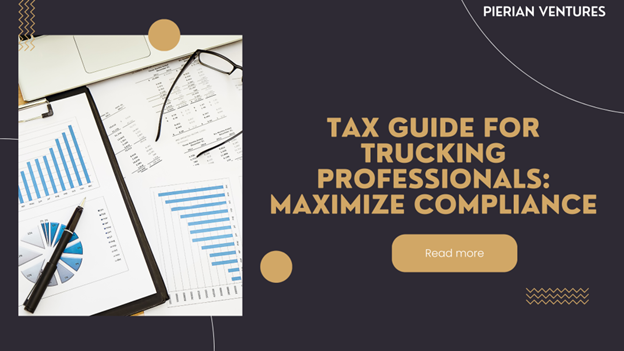Introduction to Tax Reporting
Tax reporting can be a difficult and complicated undertaking for trucking professionals and owner-operators. Knowing your tax responsibilities is essential to optimizing your profits and guaranteeing adherence to IRS rules, whether you’re operating your fleet as an independent contractor or driving great distances. Ignorance could result in missing deductions or expensive penalties that lower your net income.
The main elements of trucker tax reporting, including income reporting, deductible costs, and fuel taxes, will be dissected in this extensive book. Understanding these ideas will provide you the skills you need to manage tax season effectively, reduce your liability, and retain a larger portion of your income.
Essential Tax Reporting Strategies for Trucking Professionals
Whether you operate as an employee or as an independent owner-operator, you must be informed of the different tax regulations that are relevant to your circumstances as a trucking professional. Compared to regular workers, truckers have different tax responsibilities because they are often classified as self-employed. The principles of income tax filing, however, are global.
Income Reporting for Truckers
The majority of trucking professionals use Form 1099-NEC, which can be obtained by clients who paid them at least $600 during the tax year, to report their income as they are independent contractors. Truckers must record all earnings from trucking-related operations, including cash, checks, direct deposits, and any bonuses or incentives received, even if a customer does not issue a 1099.
Self-Employment Tax
Truck drivers who work for themselves are required to pay both income tax and self-employment tax. The self-employment tax rate remains at 15.3%, comprising 12.4% for Social Security and 2.9% for Medicare. For 2024, the Social Security portion applies to the first $168,600 of your net earnings.
It’s crucial to keep in mind that your net earnings—your gross income less deductible business expenses—are used to compute your self-employment taxes.
Maximizing Deductions to Reduce Taxable Income
Maximizing Deductions to Reduce Taxable Income
Trucking professionals have access to numerous deductions that can significantly lower their taxable income. Understanding which expenses are deductible and how to report them is essential to minimizing your tax liability.
Vehicle Expenses
As a trucker, your vehicle is likely your largest business expense. There are two main ways that the IRS allows you to deduct vehicle expenses:
- Standard Mileage Rate:For 2024, the IRS standard mileage rate for business use is 67 cents per mile.
- Actual Expense Method: This method requires you to track all vehicle-related expenses, including fuel, insurance, repairs, and depreciation. You can then deduct the business portion of these costs. If you use your truck for both business and personal purposes, you need to calculate the percentage of miles driven for business and apply that percentage to the total costs.
Both methods have their pros and cons, but choosing the right one depends on your specific situation. In most cases, the Standard Mileage Rate is simpler, but the Actual Expense Method may result in larger deductions for those with significant vehicle-related expenses.
Fuel Costs
Fuel expenses are a major cost for truckers, and fortunately, they are fully deductible. To ensure accuracy, you should maintain detailed records of fuel purchases, including receipts and mileage logs. This will allow you to report fuel costs properly and ensure that you’re claiming the maximum allowable deduction for both local and long-haul driving.
Insurance
Truckers are required to carry various types of insurance, including liability insurance, cargo insurance, and truck insurance. These premiums are deductible as business expenses, reducing your taxable income.
Repairs and Maintenance
Costs for repairs and regular maintenance on your truck are also deductible. This includes oil changes, tire replacements, brake services, and any other repairs necessary to keep your vehicle running smoothly. Be sure to keep all receipts and records for these expenses, as they are vital for proper reporting.
Meals and Lodging
When you’re on the road, meal and lodging expenses can add up quickly. The IRS allows truckers to deduct 50% of their meal expenses while traveling for business. Additionally, lodging costs incurred while away from home on business are fully deductible. As with all other expenses, it’s essential to keep receipts and accurate records.
Office Supplies and Equipment
If you operate your trucking business from a home office or have a dedicated office space, you may be eligible to deduct a portion of your rent or mortgage, utilities, and internet expenses. Additionally, office supplies such as computers, printers, and mobile phones used for business purposes are deductible.
Licensing and Permits
As a trucker, you are required to have several licenses and permits, such as the IRP (International Registration Plan) plates, IFTA (International Fuel Tax Agreement) stickers, and DOT (Department of Transportation) numbers. These licensing fees and permits are also deductible.
Depreciation
If you purchase a new or used truck for your business, you can depreciate the cost of the vehicle over several years. This allows you to write off a portion of the truck’s value each year, helping to reduce your taxable income.
Communication Costs
Staying connected while on the road is essential for truckers, and communication costs are fully deductible. Expenses related to mobile phones, satellite radios, and other communication tools are business expenses. However, you must distinguish between business and personal use to ensure accurate reporting.
Fuel Taxes and the IFTA
For interstate truckers, fuel taxes are an important aspect of tax reporting. The U.S. and other countries have an agreement called the International Fuel Tax Agreement (IFTA) that simplifies fuel tax reporting for truckers traveling across state and international borders.
IFTA Reporting
Every quarter, truckers must file an IFTA report, detailing the fuel purchased and miles driven in each jurisdiction (state or province). Based on this information, truckers will either owe taxes or receive a refund. Accurate tracking of fuel receipts and miles is critical for proper IFTA reporting.
Best Practices for Recordkeeping
Accurate and thorough record keeping is essential for successful tax reporting. Whether you’re tracking income, expenses, or fuel purchases, maintaining clear and organized records will make tax time much easier and help prevent costly audits.
Here are some best practices for maintaining your records:
- Keep All Receipts: Save receipts for all business-related purchases, including fuel, meals, lodging, repairs, and supplies.
- Track Mileage: Use a mileage log or an app to track the miles driven for business purposes. This is crucial for calculating deductions related to vehicle expenses and fuel taxes.
- Separate Business and Personal Accounts: Maintain a separate business bank account and credit card to simplify recordkeeping and expense tracking.
- Use Tax Software or a Tax Professional: Consider using tax software designed for truckers or hire a tax professional who understands the nuances of trucking taxes.
Tax Deadlines and Filing Requirements
The IRS deadline for filing your taxes is typically April 15th, unless you request an extension. Additionally, as a self-employed individual, you may be required to make quarterly estimated tax payments to cover your self-employment tax and income tax obligations. There may be penalties as well as interest if these payments are not made on time.
Tax Tips for Truckers
- Consult with a Tax Expert: Trucking taxes can be complex, and working with an accountant who specializes in trucking taxes can help ensure that you maximize deductions and avoid errors.
- Consider Retirement Savings: Truckers can open tax-efficient retirement accounts such as a SEP IRA or Solo 401(k) to reduce taxable income and save for the future.
- Track Your Time on the Road: Keep detailed records of your hours and miles driven to ensure you’re claiming all available deductions.
Conclusion
Tax reporting for truckers may seem overwhelming, but with proper preparation and organization, it doesn’t have to be stressful. By understanding your income reporting requirements, maximizing deductions, and keeping thorough records, you can reduce your tax liability and ensure compliance with IRS regulations. Whether you’re a self-prepared trucker or working with a tax professional, knowing the ins and outs of trucking taxes is essential for keeping more of your hard-earned money



